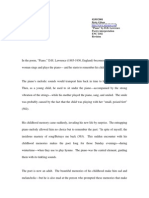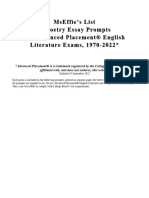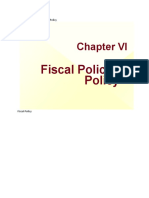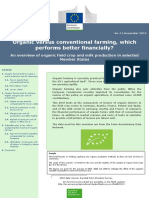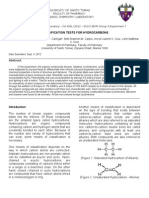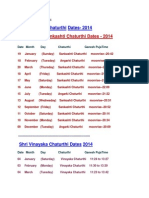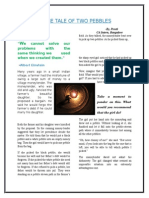"Piano" explores the powerful hold that childhood memories can exert throughout one’s life.
Listening to a woman singing, transports the poem’s
speaker back to his childhood, when his mother would play the piano and sing hymns on Sunday evenings. The speaker weeps with longing to once
again experience “the old Sunday evenings at home,” yet understands that, as a grown man, he no longer can. His memories thus provoke deep
sadness, reminding him of his youthful sense of wonder while casting childhood as a kind of lost homeland to which he can never return.
Piano the piano may be seen as a trigger; an apparently simple
object which powerfully creates complex emotions
BY D . H . LA WRENCE
The overwhelming power the adult speaker, listening to a woman sing, recalls vivid
of memory is triggered memories of his childhood and his mother: 'Taking' him back
through music and singing down the 'vista of years'
Softly, in the dusk, a woman is singing to me; the juxtaposition of the onomatopoeic 'boom’ with the
the speaker is contrasting ‘tingling strings', brings out the amplification of the
taken to a Taking me back down the vista of years, till I see sound effect for the child actually sitting under the piano'
world of past
recollectionsA child sitting under the piano, in the boom of the tingling strings
And pressing the small, poised feet of a mother who smiles as she sings.
The use of sibilance in the words "small", "smiles" he enters a world of lovely memories of a happy smiling mother who used to
and "sings" reflects the mother’s tenderness sing and play the piano to him.
the description perhaps suggests the piano is an extended metaphor for the speaker's happy
childhood, where great things or great memories came out of many small actions or events
such as, sitting under a piano and pressing the small feet of the mother. There is a strong
sense of closeness between child and mother, emphasised by the alliterative phrase: ‘
pressing the small, poised feet’ the power of music is shown by the phrase ‘insidious mastery
In spite of myself, the insidious mastery of song of song’: music draws him back to his childhood, despite
himself.
Betrays me back, till the heart of me weeps to belong
To the old Sunday evenings at home, with winter outside
And hymns in the cosy parlour, the tinkling piano our guide.
the imagery used in the poem creates a traditional family setting, which is
music takes hold of him
possibly an idealised recollection: 'with winter outside / And hymns in the cosy
and "betrays" him so that
parlour'. The speaker is perhaps longing again for that sense of security that
he has no control of what's
being a child gave him, specially, the warm comfort of a mother's presence
happening to him
The poem is nostalgic and emotive. The tone of the
poem is mixed as the speaker reminisces: he feels
much warmth at ‘The glamour / Of childish days’ with
So now it is vain for the singer to burst into clamour his mother, in contrast to his response to the
With the great black piano appassionato. The glamour discordant "clamour" of the singer in the present, ‘
With the great black piano appassionato’
Of childish days is upon me, my manhood is cast
Down in the flood of remembrance, I weep like a child for the past.
emotions are heightened: 'I weep like a child for the past' and he is also overwhelmed with sadness in the metaphor: ‘my manhood is
cast / Down in the flood of remembrance’ as he recalls precious moments spent with his mother. The ‘flood of remembrance’ suggests
the idea of an uncontrollable force which is music that brings upon him his childhood again. The simile "like a child' once again
emphasises his uncontrollable longing for the past.
The poem is written in three quatrains (4 line stanzas) and has a regular rhyming pattern, mimicking the harmonious and powerful nature of
music. The simple rhyming pattern reflects the simplicity of childhood. The poem is written from a first-person perspective.
The poet uses enjambment to create a flowing structure in each stanza which contains a single, long sentence and ends with a full stop.
It is significant that both the past and present action are described in the present tense, giving a sense that to the poet the past memory is
equally real as the present reality. It gives us the feeling that the poet is re-living the memories rather than merely recalling them.




















